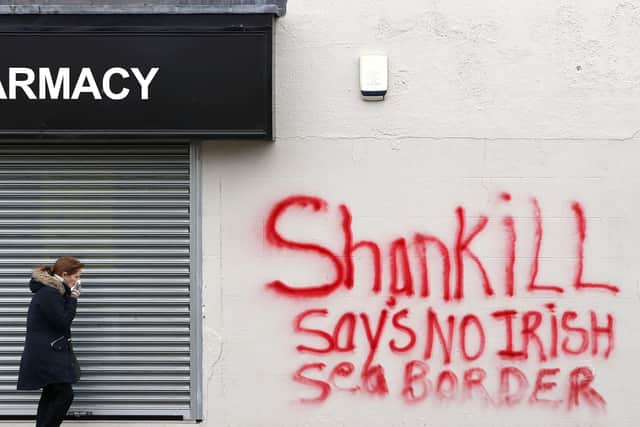Alex Kane: Unionism needs to speak, and think, with one voice


At the end of January Jim Allister announced his three-point plan for a united unionist opposition to the NI Protocol. A few days later Arlene Foster launched the DUP’s ‘united message from unionists – free us from the protocol.’ And in Friday’s News Letter Peter Robinson suggested a ‘pan-unionist response that all unionist parties can support ... the greatest danger is allowing drift and dither to become the strategy’.
Peter has a point: indeed he made a similar point in June 1987, when he was co-author, along with Harold McCusker and Frank Millar of the UUP, of the response to the Anglo-Irish Agreement, the Task Force Report: ‘There is recognition that Northern Ireland’s position within the Union has been steadily and successfully undermined since the late 1960s. Our various discussions pointed to the need for action to arrest a widely perceived drift in our affairs. This demand for action is tempered by a realistic appraisal of the limits of Unionism’s negotiating strength.
Advertisement
Hide AdAdvertisement
Hide Ad‘The temptation in such circumstances might be to do nothing. However we would consider this the ultimate abdication of responsibility. Recognising the inadequacies of the existing protest campaign we propose the creation of a Unionist Convention to construct and lead a renewed campaign to manifest the absence of consent for the arrangements by which Northern Ireland is presently governed.’


Regular readers will know that I’ve long favoured the creation of a pro-Union council/committee composed of academics, historians, ‘influencers’, representatives from the huge and diverse unionist/loyalist/pro-union/civic unionist community and observers from the various unionist parties. The task of the council – and yes, I know I bore some of you with this hobbyhorse – would be to consider all challenges facing unionism, to prepare option papers for all eventualities and to ensure unionism isn’t constantly surprised and forced onto the knee-jerking back foot.
It isn’t, by the way, quite the same thing as unionist unity: for that tends to mean party-political unity and that leaves out a huge swathe of unionism which, while pro-Union, isn’t necessarily comfortable with how party-political unionism manifests itself. And I also think that party-political unity right now could be difficult, not least because the DUP, ‘as the largest party,’ would try and control the agenda and immediately face discontent from those who partly blame it for the present crisis.
But the fact is that the crisis affects everyone in Northern Ireland who would describe themselves as unionist or pro-Union (and, as I keep reminding people, those are not quite the same thing). Our constitutional identity has been changed. Fair enough, the final determination will still hang on the outcome of a border poll (one of the tasks the pro-Union council could take under its wing), but it’s hard to deny the unpleasant reality that something very significant – and unsettling – has happened to unionism.
Advertisement
Hide AdAdvertisement
Hide AdAs it stands right now it doesn’t really matter if most goods coming from GB to NI arrive by sea, air, bridge, tunnel, Tardis or Harry Potter’s broomstick: for when they arrive they do so in a Northern Ireland which is now classified – unlike England, Scotland and Wales – as part of the EU. That’s a huge political/psychological/emotional blow for unionism.
But something does need mentioned at this point. The original explanatory note for the UK’s proposals for an amended protocol on Ireland/Northern Ireland was published on October 2, 2019. This was the first time the Irish Sea border properly came into the public domain. A number of ‘protest meetings’ were held across NI in the succeeding few weeks and just about every significant voice within political unionism (and I talked to most of them) raised concerns about the impact of such a border.
I wrote this overview in December 2019: “For unionism there is a clear lack of unity (other than recognising there is a problem), a lack of an agreed strategy, a lack of key influential friends outside its own base in NI and a lack of preparation for what may happen in just a matter of months ... Unionism is no stranger to political crises, yet the crisis Boris Johnson has landed it with is new. Much of unionism seems to expect the worst and that outcome is certainly possible if fear, again, overcomes caution and an imaginative response. Everything remains in play.”
Now, over a year later, unionism is only just getting around to a broader discussion about a concerted strategy to address a threat which was very big and very obvious over a year ago. Again, had something like a pro-Union council been in place (and it was a proposal also endorsed by Peter Robinson in September 2012) its input to strategy and response could have been invaluable.
Advertisement
Hide AdAdvertisement
Hide AdBut, in that awful phrase, we are where we are. Foster, Aiken, Allister et al are right: nearly all of unionism opposes the protocol. So, what do they do? Recognise the strongest cards they hold. Identify friends they can rely on in London, Dublin and Brussels. Have alternatives to offer, rather than just absolutist rejections. Understand the consequences of getting what you want: or don’t want.
And the most important thing of all? Agree on the strategy (particularly re the Assembly), speak with one voice and don’t provide distractions or divisions which will be pounced upon by opponents. If that looks like it isn’t possible – and it may not be – then don’t pretend it is, just for the sake of being seen to do something.
Advertisement
Hide AdAdvertisement
Hide Ad• Peter Robinson: Unionists might face a choice between keeping Stormont or scrapping the Irish Sea border
• Jim Allister: It may well be a choice between Stormont and the Irish Sea border, as Peter Robinson says
Advertisement
Hide AdAdvertisement
Hide Ad• Ben Lowry in 2020: Last night unionists celebrated a move towards Irish unity
——— ———
A message from the Editor:
Thank you for reading this story on our website. While I have your attention, I also have an important request to make of you.
Advertisement
Hide AdAdvertisement
Hide AdWith the coronavirus lockdown having a major impact on many of our advertisers — and consequently the revenue we receive — we are more reliant than ever on you taking out a digital subscription.
Subscribe to newsletter.co.uk and enjoy unlimited access to the best Northern Ireland and UK news and information online and on our app. With a digital subscription, you can read more than 5 articles, see fewer ads, enjoy faster load times, and get access to exclusive newsletters and content. Visit https://www.newsletter.co.uk/subscriptions now to sign up.
Our journalism costs money and we rely on advertising, print and digital revenues to help to support them. By supporting us, we are able to support you in providing trusted, fact-checked content for this website.
Alistair Bushe
Editor